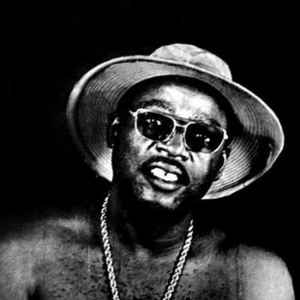C.K. Mann (Charles Kofi Amankwaa Mann) was born in 1936 in Cape Coast, and passed away at 83 years on March 20th, 2018 at the Ghapoha Hospital in the Western region of Ghana. A former seaman and a member of Moses Kwaku Oppong's Kakaiku’s Guitar Band for some time, he joined the Ocean Strings’ which he led until 1965. The band folded up and the owner of Princess Cinema in Takoradi invited C.K. to lead the Carousel 7, a newly formed resident band of the Princess night club. He then came to prominence with a single hit record Edina Benya in 1969. His music career spanned over four decades and he won multiple awards for his songs. He was awarded the Grand Medal of Ghana by former President John Agyekum Kufuor in 2006. With old age and ill health, by 2015 Mann had not performed publicly in several years. He lived at Anaji, a suburb of Takoradi. The street on which his house is located has been renamed C. K. Mann Avenue.
C.K. has leaped to fame with his captivating revival and modernization of "Osode", the traditional music of the fishermen of Ghana. C.K. Mann explains: "The raw and pure Osode vocal ensemble is unique and can’t be equalled by anyone other than the fishermen folks. I also wanted to play Osode and make it appeal to a much wider audience. So I changed the instrumentation a bit and to the Ashowa, the hand piano or rhythm box that is used to perform Osode, I added two guitars, organ, bass, etc. But I managed to maintain some of the original ingredients such as the hand-claps, and the call and response style of singing." The outcome of this combination was a mildly melancholy sound which was quite popular on the Ghanaian West Coast market. After the success of Osode, C.K. introduced wind instruments: the saxophone and trumpet, into his band, The Carousel 7.
In French:
C.K. Mann (1936-2018)
C.K. Mann (Charles Kofi Amankwaa Mann) est né en 1936 à Cape Coast. Ancien marin et membre du Kakaiku’s Guitar Band pendant quelque temps, il rejoint la formation Ocean Strings qu’il dirigea jusqu’en 1965. Le groupe disparut et le propriétaire du Princess Cinema à Takoradi invita C.K. à diriger le Carousel 7, un orchestre nouvellement créé pour la discothèque Princess. Il connut la notoriété avec un single sorti en 1969 : Edina Benya.
C.K. connut la gloire grâce à sa remise au goût du jour et modernisation captivante du Osode, la musique traditionnelle des pêcheurs du Ghana. Il explique que « l’ensemble vocal pur et brut Osode est unique en son genre. Il ne peut être égalé que par les pêcheurs. Je voulais également jouer l’Osode et désirais la rendre accessible à un public beaucoup plus large. J’ai donc légèrement changé les instruments et j’ai ajouté deux guitares, un orgue, une basse, etc. à l’ashowa, le piano à main ou boîte rythmique utilisée pour jouer l’Osode. J’ai cependant réussi à préserver quelques-uns des ingrédients originaux, comme le claquement de mains, ainsi que le style de chanson appel-réponse. » Le résultat de cette combinaison fut un son assez mélancolique très populaire sur le marché de la Côte occidentale ghanéenne. Après le succès d’Osode, C.K. introduisit des instruments à vent dans son orchestre, The Carousel 7 : le saxophone et la trompette.
L’auteur, compositeur, arrangeur, chanteur et guitariste expert, est une des figures emblématiques du highlife (ou hilife) auquel il a greffé du funk, lançant en 1975 le Funky Highlife, avec son fameux groupe Carroussel 7... C.K. Mann commence à devenir célèbre au début des années 1960 lorsqu’il intègre comme guitariste l’orchestre Kakaiku's Guitar Band de Moses Kwaku Oppong. Plus tard, il devient le leader du groupe Ocean’s String qu’il quitte en 1966. Sur une proposition d’Anis Moubaratk, propriétaire du Princess Club, il fonde Carroussel 7 devenu Caroussel Ago-go Takoradi, la formation attitrée du club. A la sortie, en 1969, de son 45 tours Edina Benya, son premier gros tube révélant sa fusion highlife et funk appelée “Funky highlife ”, C.K. Mann connaît un énorme succès populaire. Deux ans plus tard, il enregistre Nimpa Rebre, un album mêlant highlife, funk et sonorités latines, et réalisé avec les chanteurs Pat Thomas et Kofi Papa Yankson, les mélomanes le surnomment alors “Roi du highlife”. Nous sommes en 1971 et C.K. Mann commence à tourner dans le monde entier.
